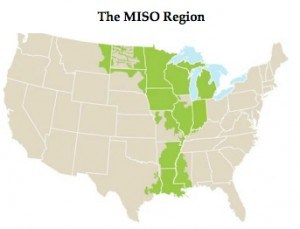MISO says summer power reserves are sufficient to meet demand even with loss of coal plants
by May 10, 2016 5:55 pm 591 views

The Midcontinent Independent System Operator (MISO) said Tuesday it has adequate reserves to meet 2016 summer peak demand even as a number of coal-fired power plants across the grid operator’s 15-state footprint have been retired.
MISO, which operates a state-of-the-art command center in Little Rock, said it expects summer demand to peak at 125.9 gigawatts (GW) and 148.8 GW of capacity will be available to meet demand. This 18.2% reserve margin is slightly above MISO’s reserve margin requirement of 15.2%, officials said.
According to MISO and data from the U.S. Energy Information Administration (EIA), generation retirements across the MISO footprint are driving a tightening of available generation across the region. These tight operating conditions, coupled with hotter weather, increase the likelihood of needing to rely on emergency operating procedures to gain access to additional resources to ensure reliability.
“MISO and its members have worked hard to ensure reliability this coming summer,” said Todd Ramey, vice president of system operations. “While we are predicting adequate resources, generation retirements across the region create a new operating reality. MISO will continue to work with stakeholders to make sure MISO is well-positioned for the future.”

According to the EIA, nearly 18 gigawatts (GW) of electric generating capacity was retired in 2015, a relatively high amount compared with recent years. More than 80% of the retired capacity was conventional steam coal. The coal-fired generating units retired in 2015 tended to be older and smaller in capacity than the coal generation fleet that continues to operate.
Coal’s share of electricity generation has been falling, largely because of competition with natural gas. Environmental regulations affecting power plants have also played a role. About 30% of the coal capacity that retired in 2015 occurred in April, which is when the U.S. Environmental Protection Agency’s Mercury and Air Toxics Standards (MATS) rule went into effect.
Some coal plants applied for and received one-year extensions, meaning that many of the coal retirements expected in 2016 will likely also occur in April. Several plants have received additional one-year extensions beyond April 2016 based on their role in ensuring regional system reliability.
MISO said it works with member companies to prepare for increased system demand during hot summer months to ensure reliability is maintained. The nonprofit regional transmission organization is also holding six summer readiness drills with MISO operators, members and others to review emergency operating procedures and communications.
With the addition of the MISO South region in 2013, MISO said it is also focused on preparing for the possibility of hurricanes. MISO has convened a Hurricane Readiness Team to identify and address any gaps in current operating plans. MISO is working closely with its members in the South region to coordinate on hurricane preparedness and contingency planning.
MISO said it continues to work with stakeholders to address long term resource adequacy needs through a range of efforts. This includes providing increased transparency around future resource projections with the Organization of MISO States (OMS) – MISO survey. Additionally, MISO continues to work with stakeholders to improve MISO’s resource adequacy construct around locational and seasonal issues.
